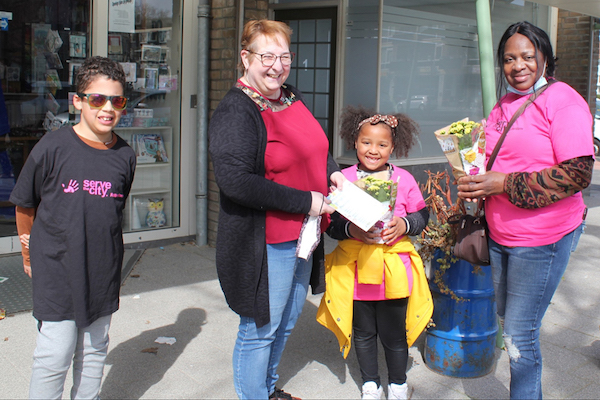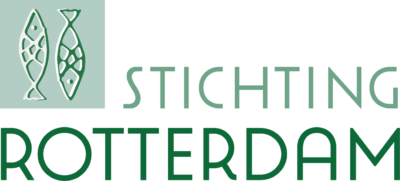SKIN Rotterdam
SKIN Rotterdam aims to bring together and support the estimated 200 Christian international communities in Rotterdam and beyond so that they can be a powerful and positive voice in society. SKIN-Rotterdam does this through various projects including informal language education, labor market participation, poverty, health, connection in the neighborhood and discrimination and racism. We have a broad network and work with different partners as much as possible. The Rotterdam Foundation is involved in two SKIN-Rotterdam projects:
Krachtig Verbonden (Powerfully Connected)
In this project we want to strengthen Christian international communities by stimulating, activating and equipping pastors and (potential) leaders and connecting the communities with each other and with their environment. We leave information via website, news items and social media; we give courses for example on financial and church management; we hold meetings on current and/or relevant social topics and we bring community leaders together for exchange and conversation. In addition, we give a lot of individual advice and guidance on issues of the communities, for example on church housing, noise pollution, work, language, debt, health, etc. We build bridges by organizing meetings with the Christian international communities among themselves, with native churches and with social organizations, and we do political and social education around elections and through field trips.
Education & Development
Parents and youth from Christian international communities have to deal with different norms and values that create gaps between generations and cultures. Key people from the communities receive training and peer review on the parenting issues they see in the people in their community. There are also expert meetings and open workshops on parenting issues. Topics include: authority relationships in the family, social skills, sexuality and lifestyle, safety, handling money, responsibility, pressure and achievement among young people, self-confidence, community and individual. Activities are also focused on the development of the young people themselves under the name SKIN-Young.
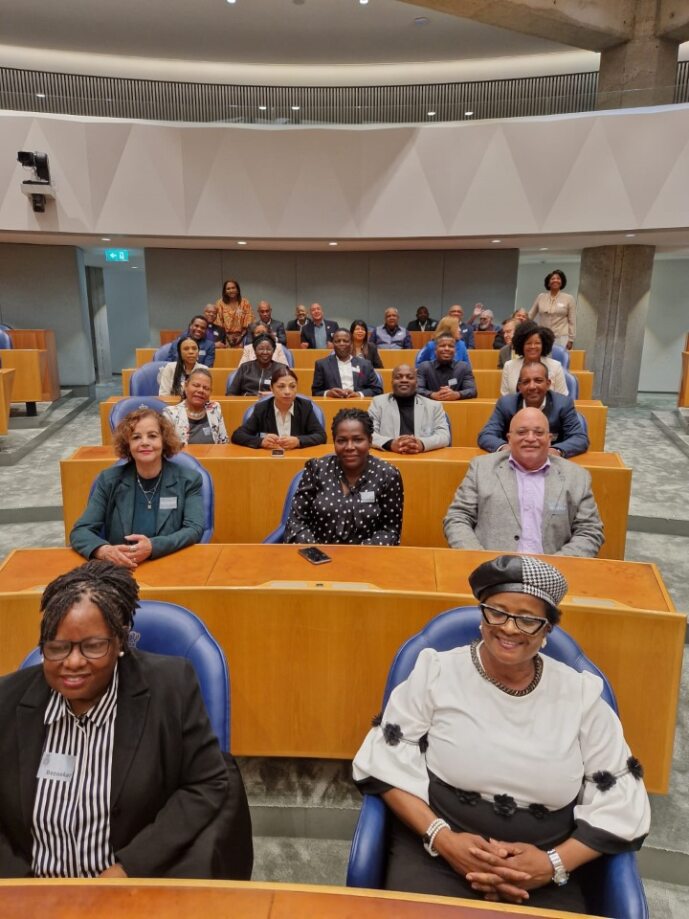
House of Hope
The House of Hope is a neighbourhood organization with three walk-in centres in Rotterdam South, in the districts of Tarwewijk, Katendrecht and Beverwaard.
In these neighbourhoods, a large number of residents live in poverty and loneliness. Many residents struggle with unemployment, debts and an uncertain housing situation.
Also in these neighbourhoods with large numbers of children, there are many broken relationships and one-parent families. House of Hope was launched in 2004 by the International Christian Fellowship community in Rotterdam. The organization has since grown into a community of 300 volunteers and 18 paid employees.
House of Hope provides social, diaconal and pastoral work
for the full breadth of society, regardless of age, race, culture, religion or situation.
In the neighbourhoods where we are active, we want to serve people by facilitating their access to care and activities that bring them together. We focus primarily on groups that are difficult to reach and those who are at risk of of falling between two stools due to complex circumstances.
Every day, residents can come to our walk-in living room for a cup of coffee and a listening ear. We also visit people at home. We see people and their talents and encourage them to participate as volunteers and become part of the “family”. In this way we take care of …
More life in the neighbourhood!
House of Hope works using five focal points:
We focus on finding people who, for a variety of reasons, are not in the picture and therefore miss out on care.
Connecting people focuses on combating loneliness. We do this in part through our group offerings and visiting people in their homes.
Strengthening takes place primarily by providing professional help, but it can just as easily be a food package or a job around the house.
Together, as a neighborhood family, we celebrate life’s beautiful moments. We also celebrate when people volunteer and blossom again.
Deepening takes shape in pastoral care and equipping, with attention to questions of meaning, trauma and prayer.
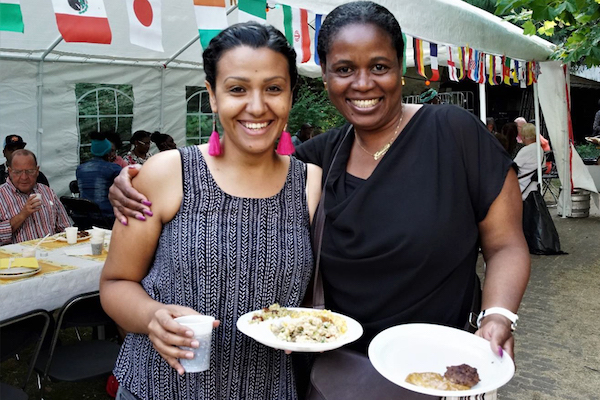
Schuldhulpmaatje (DebtReliefBuddy)
We can do this together, that’s what we believe at the Debt Relief Buddy Association in the Netherlands. Especially when you’re in debt, you need someone who believes in you and helps you. Someone who’s there for you and who helps you get your finances in order without judgement. Our Buddies do that.
In the Netherlands, 1 in 5 households face debt. People are often ashamed and only seek help when it’s too late. SchuldHulpMaatje is committed to reaching and helping people with financial problems as early as possible. Guiding behavioral change and developing financial self-reliance is central to this. The aim is to reduce the growing debt problem.
SchuldHulpMaatje is active in 160 municipalities in the Netherlands
with over 3,200 volunteers who support some 10,000 people like Dorota every year:
All she could do was cry, though she pretended to the outside world that nothing was wrong. Meanwhile, Dorota’s debts were growing and she had no idea how to turn the tide. Until Mate Nico came into her life.
Polish Dorota, now 43, came to the Netherlands years ago because her then-boyfriend worked and lived here. She soon found her niche. She started her own business and also had a job in the Westland flower industry. But then things went wrong and one thing after another happened to Dorota: her relationship ended, her father died, her home was broken into, she had a car accident and also became unemployed. “It was too much for me,” she looks back. “I couldn’t oversee it anymore and had no energy to deal with money matters and administration. Will come later, I thought. Besides, I didn’t know anything about it. My boyfriend always took care of those things.”
Buddy Nico became Dorota’s rock. “I was so grateful that help came,” she says. “I felt like I could breathe again. We started opening all the letters and organizing everything. I had no idea how much debt I had. With the Tax Office alone, they turned out to have reached 80,000 euros.” They soon discovered that this debt was unjustified because Dorota had long since ceased to own her own business. By proving this, nothing was left of this debt in the end. The other debts Dorota, who by now was working again through an employment agency, paid off little by little. The municipality’s budget management department helped her. It took her almost three years, motivated from the beginning to solve the problems she had caused herself.
Dorota and Nico are still in contact. If a complicated letter comes, they still tackle it together. Looking back, Dorota would prefer to say to anyone who would like to hear: “Do you have money problems? Ring the bell! You tend to isolate yourself; I did too. I distanced myself from friends and locked myself in the house. Don’t do that on the contrary, don’t fool yourself and others. Talk about it!”
Find more stories of experience at www.schuldhulpmaatje.nl/ervaringsverhalen
SchuldHulpMaatje is an initiative of the churches in the Netherlands. Charity is our basis and the gospel is our inspiration. Anyone who needs help with financial problems can count on the support of our SchuldHulpMaatjes. Regardless of religion, race, orientation or origin. SchuldHulpmaatje also helps churches to pay preventive attention to money worries themselves. For tips, visit www.redjehetwel.nl
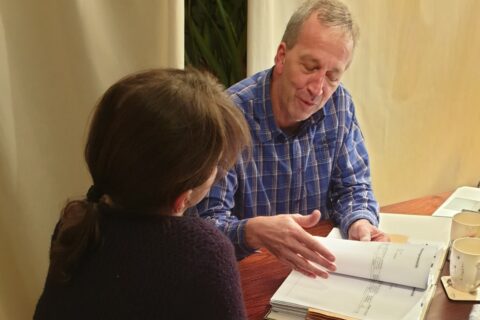
Drugspastoraat Amsterdam (Amsterdam Drug Addicts Pastoral Care Foundation)
Whatever your opinions, drug-use is a fact. People use drugs for many reasons, often unfortunate, even tragic. The risks, particularly of hard drug-use, are known. Recovery is difficult. Drugs, often sought as liberation, rob users of their freedom. Yet they continue to lure people, and problems arise for users and for those around them.
Opinions differ about what’s best for drug users, measures against nuisance, tackling drug trafficking. But we agree on one thing:
Whoever is in need must get help.
God loves every person, whoever or whatever they are.
That is the fundamental principle of the Drugs Pastoraat Amsterdam.
Accepting people as they are, and valuing human dignity unconditionally. Helping people find meaning in life, and celebrating their bond with God and humanity.
The Drugs Pastoraat Amsterdam assists drug users impartially, helping them get support in their daily care, as far as they want or need it. Drugs Pastorate Amsterdam points the way to assistance, mediating where possible with authorities and government institutions.

Protestantse diaconie Amsterdam (Protestant Diaconia Amsterdam)
The Protestant Diaconia Amsterdam s part of the Protestant Church in the Netherlands. The Diaconate stands in a tradition in which ‘participating and looking after each other’ is central. Traditionally the Diaconate has had foundations and almshouses for the care of ‘widows and orphans’. Today we are present in various Amsterdam neighborhoods through communities and diaconal centers. Together with residents, neighborhood churches and social partners, the Diaconate focuses primarily on solidarity with people and groups facing social exclusion. An important part of diaconal outreach work consists of creating and maintaining networks in neighborhoods so that people meet, see and support each other. We do this in various parts of the city, including walk-in mornings and meal groups for local residents. There are programs in the areas of neighborhood help, language lessons and help with finances. Material assistance is also provided in cases of concrete need.
One example is the Social Market in Amsterdam North
where there is cooperation with the Food Bank and the Salvation Army. The Diaconate is also active there in the area of democratization, through the platform De Noordas. This is a community of local residents, diaconal community workers and other stakeholders who bring issues around poverty, inequality, housing shortage to the attention of policy makers.
Besides outreach work, the Diaconate has projects aimed at target groups, such as the Street Pastorate for people with no fixed place to live or stay. And the World House and educational farm de Meent for undocumented migrants.
The work of the Diaconate is guided by the search for equality and reciprocity. So with and for residents and participants, encouraging ownership and social entrepreneurship.
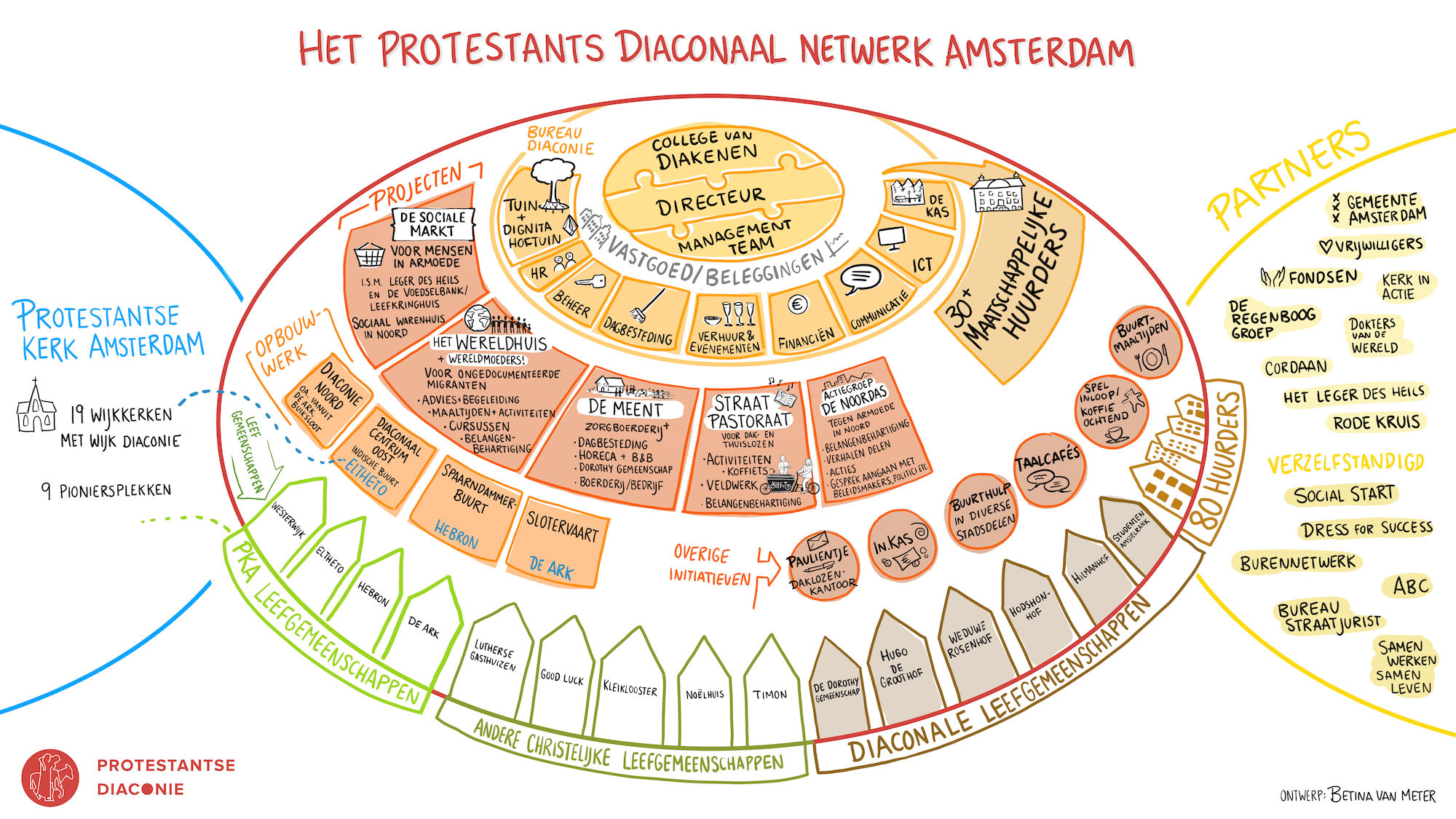
HipHelpt
The government expects people to be increasingly self-reliant. But vulnerable people are far from always getting that. After all, what if you are sick, in financial distress or have no one nearby to fall back on?
HipHelpt sees to it that help does come: www.hiphelpt.nl. With 30 local foundations throughout the Netherlands, approximately 3500 volunteers from churches and neighborhoods dedicate themselves to neighbors who are on their own. They are driven by charity and inspired by the Gospel. And they offer help to people who need it, regardless of their culture or religion. No one needs to be alone.
Thanks to the unique HipHelpt app volunteers get quickly
and easy in contact with people who need help. Just like the app, the HipHelpt helpdesk always looks for a match in the neighborhood. This brings supply and demand together and creates new contacts in the neighborhood. The volunteers also see whether more help is needed, for example because people are lonely or struggling with financial problems. William, who has been active for HipHelpt since 2018 and has helped many people who need help, can tell you a lot about this:
“I was always interested in volunteering, but mostly short jobs, so to speak. HipHelpt is easy to schedule because you often do it on your own. And because I signed up for certain types of help requests, such as cleanup, garden chores and the like, the requests do keep coming. I have a desk job with the government. There I help people, say, over the phone, or I award people rent subsidies. But I also just need fresh air, so I like to be able to help with my hands. Then I see that behind the front door there is also a lot of loneliness. Sometimes this is self-inflicted, but also because society is quite complex. I also meet people who have become stuck in society between the wheels. That is not nice. It’s good when you can have an impact on someone else’s circumstances.
I am also helping someone who lives close to me. Her front yard looks neat, but inside the house is a different story. When I got to her attic, it looked like it hadn’t been touched in 30 years. A lot of that needs to be gotten rid of. She is a little forgetful, a little confused, but she is grateful for what I can do for her. Her shed also needs to be cleaned up, and maybe I’ll prune her backyard too. That’s how I roll from one thing to another. I have a family of my own, and find it important not only to focus on work but also on family. Of course, this also leads to conversations about this at home. Fortunately, my wife does support my volunteer work, because it’s just who I am. But it’s still a matter of just planning well, isn’t it?”
HipHelpt would like to be active in more municipalities in the Netherlands in the coming years so that with even more churches and volunteers it can connect people who are on their own in an accessible way. A helping hand to a person seeking help makes for a nice encounter, often in the immediate vicinity of the person seeking help. See if we are already active in your area at https://hiphelpt.nl/locaties
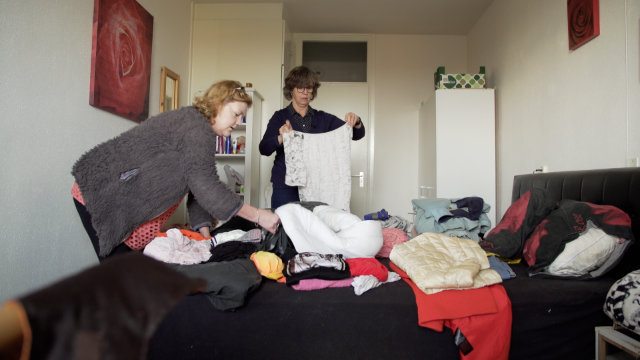
De Bakkerij Leiden
Diaconal Center The Bakery has been a place of help in downtown Leiden for nearly 600 years. In its present form, the diaconal center has an ecumenical character due to the cooperation of Protestant and Roman Catholic churches. In the Middle Ages, you could go to the Poorhouse with a bread coin to get bread and peat, and centuries later 2,000 servings of soup a day were also provided to refugees.
Even today people come with a request for help, people who can no longer make ends meet, need advice, a financial bridge, shelter or temporary support of living expenses. This individual help is at the heart of our work.
‘Helping where there is no helper’.
In addition to fixed pillars of the social project M25 for high school students and buddy project “Grandma Goes Out” for lonely elderly people, we initiate project aid and collections for current needs: Such as facilities for meals, meeting and financial counseling for people in energy poverty. We lobby for dental care, shelter and medical care for undocumented people. In cooperation with the churches of Leiden we offer shelter to more than fifteen people who have applied for asylum in Ter Apel but cannot be accommodated by the state because of insufficient facilities.
In and for the city we annually organize the Peace Meeting and the Meeting Meal, a meal where about 200 people from all walks of life, from mayor to homeless or undocumented eat together.
In our diaconal building we house about 20 social organizations with whom we work closely; including Refugee Council, Leids Steunloket Migranten, Adviesraad WMO, Stichting Urgente Noden, Present and Voor Elkaar Leiden. This promotes rapid cooperation around requests for help and means that De Bakkerij is often the breeding ground for new social initiatives or projects. One of our newest collaborations is with Buurtbuik. Weekly on Sundays, De Bakkerij hosts a free three-course meal of ‘saved food’ that would otherwise be thrown away.
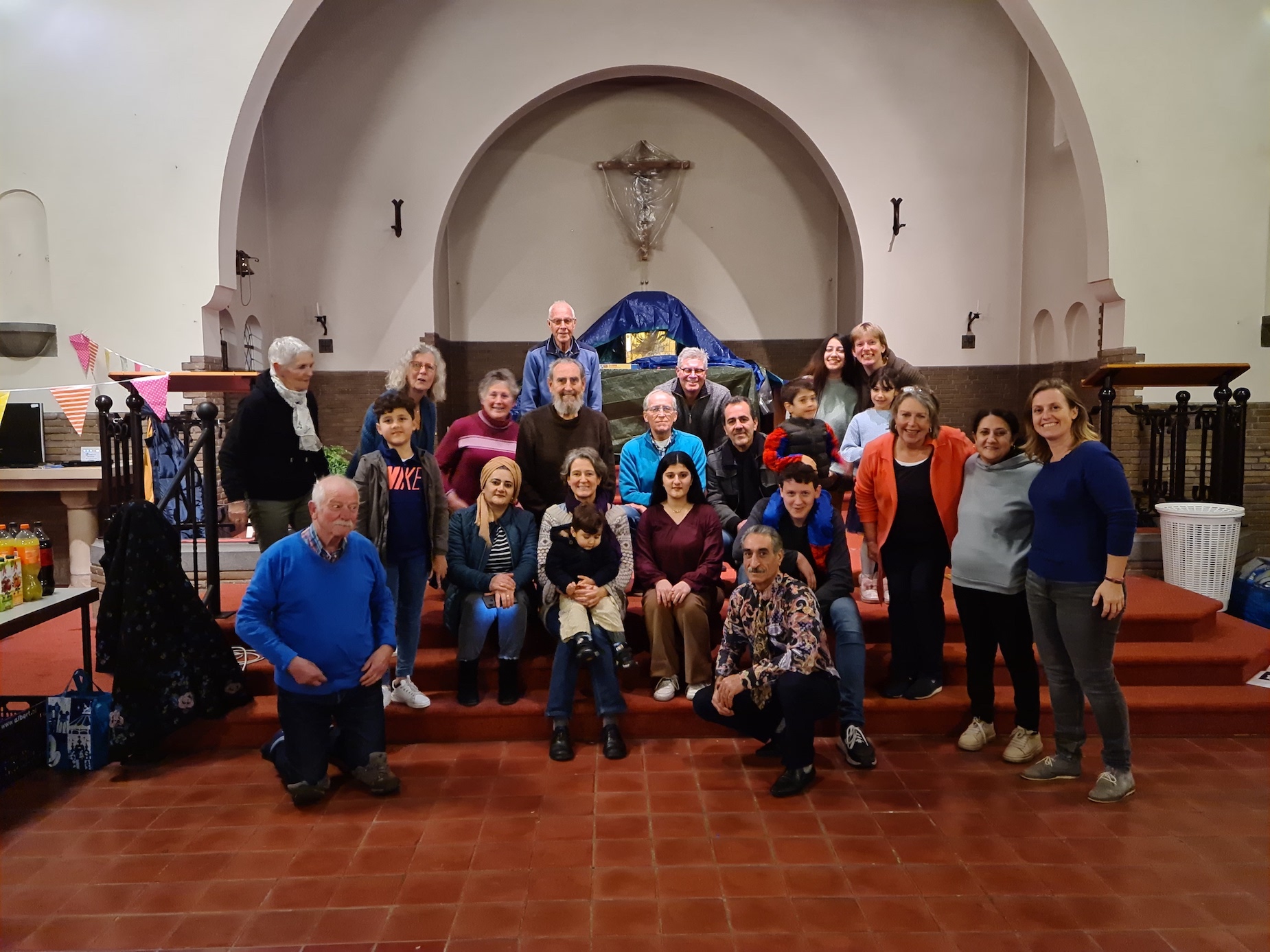
Samen 010 (Together 010) and associated partners
Rotterdam is a city where the need of many people is unprecedented. Stichting Samen 010 is an organization in which churches and volunteers work together and dedicate themselves to the residents of Rotterdam who cannot or hardly manage themselves. Together we set up and carry out volunteer projects around care, poverty and social isolation. We work from a Christian vision in which we strive to translate compassion and charity into practice. This is done by supporting people who cannot participate in society on their own.
Below we present some sample projects where the vision of Samen 010 becomes clear:
Many Rotterdam children grow up in poverty. With the Money & Family project we are trying to change this. Well-trained volunteers help families with financial problems by putting their home administration in order. The volunteer offers the family social and practical support so that the family is once again financially self-sufficient, with special attention to the situation of the children.
De Buren is a shelter where people can recover in a homely environment after illness and/or hospitalization. It also accommodates people with chronic illnesses whose caregivers need a break.
Motto is a project for elderly people living at home who need someone who really listens to them, someone who gives space to their story and listens with compassion. Volunteers at Motto are committed and knowledgeable about having meaningful conversations with seniors who need them.
Serve the City Rotterdam encourages Rotterdammers to look after each other by means of two large actions per year:
Serve the City’s Ascension Action is an annual diaconal action around Ascension Day in different areas of Rotterdam. The goal of the Ascension Action is to connect Christians or churches to work together for their neighborhood; serve the neighborhood, meet neighborhood residents and thus strengthen the network that churches have with each other and the neighborhood.
For the annual benefit action Saint for Kint, we invite churches and other groups to organize sponsorships. In addition, we additionally raise money from funds and businesses. From the proceeds, we give parents with a minimum income a coupon from the toy store, so they can buy their own Saint Nicholas gifts for their children.
The volunteers of the Energiebank Rotterdam help people on a tight budget save energy. With simple savings products and insightful tips it is possible to reduce energy consumption. This is possible for individual households or a group of people such as church members. In this way, everyone can contribute to a sustainable and livable world.
The Odensehuis Rotterdam is a friendly open house for anyone dealing with memory problems, Alzheimer’s or early dementia. The focus is on the person themselves as well as the people around them, such as the partner, caregiver, family and friends.
